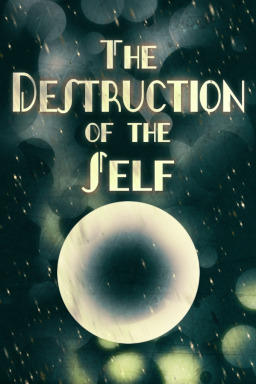
The Destruction of the Self (contest version)
I wake up, and I think I would like to be a farmer today.
Spring Heath is asleep beside me, a purple shape in the dark. I give her a nudge with my muzzle, in case she feels like fooling around, but she mumbles and rolls away.
Ah well. Perhaps tomorrow.
The house is quiet without any foals. There are no thumps echoing from the bedrooms, or slamming doors, or shouts from tiny throats that they need a special lunch today for a field trip and sorry for not mentioning it last night. It is peaceful, and I hear the grandfather clock ticking in the parlor, even from my spot sipping coffee in the kitchen.
Spring Heath descends the stairs, her coat and mane still matted from sleep. I gesture to the steaming mug waiting at her seat, and she smiles at me.
I hope I get to be a farmer today.
* * *
“Buckwheat!” The administrator calls my name, and I step out of line. My heart is pounding, and even though the spring day is still chilly, I feel the first drop of sweat run down my side.
Please be a farmer. Please be a farmer.
The administrator fumbles with the paper tag that has my name. She looks up at me, then down at the list of names on the table before her. She looks at me again, then at the tag, and finishes back at the paper.
I don’t think she’s done this before.
“Uh, Buckwheat?” She waits until I nod. “Okay, good. You're a blacksmith!”
I wince, my ears falling flat against my mane. “Are you sure? Not a farmer?”
She runs her hoof down the list of names again, then slides it sideways to the column of jobs. “No, blacksmith. Do you know where to go?”
“Yeah, I’ve done it before.” I turn away to let the next pony take my place. There’s no point in holding up the whole village.
* * *
Blacksmithing isn’t as hard as it sounds. You just heat the iron in the forge until it glows, take it out (carefully!) with the tongs, then hit it with the hammer until it’s the shape you want.
I consider the misshapen disk of wounded metal before me. It didn’t quite curve the way I’d hoped, and the sides are split in several places. If I squint, it vaguely resembles a pancake with curled edges, or maybe an ashtray.
Close enough. I place it on the shop counter, where a tan earth pony is waiting. “Here’s your bowl, sir.”
We stare at it in silence for some time.
“Okay,” he finally says. He drops a few coins on the counter and leaves with his purchase.
Rarely, maybe twice a year, Igneous gets to be the blacksmith, and she crafts masterworks for us. Plows, horseshoes, barrels of nails, on that day everything is perfect.
But today I am the blacksmith.
Maybe tomorrow I’ll get to be a farmer.
But it’s fine if I don’t.
* * *
I come home and there is a foal waiting for me. I vaguely recognize his lemon coat, and after a few seconds I speak.
“Saffron… Lark?”
“Saffron Spark,” he corrects me, then runs up to toss his legs around me for a hug. “Welcome home, dad! Mom’s making dinner.”
I walk into the kitchen, and sure enough a lime green mare is at work over the skillet. The smile on my face is genuine – the first of the day. Glenmore has been my wife before, and she makes a wonderful potato casserole. I can smell it cooking.
She trots over and kisses my cheek. “Welcome home… Buckwheat, right? How was your day?”
“Not bad,” I say. And it’s true.
* * *
I am supposed to be asleep beside my wife, but instead I lie awake in the dark. This happens, sometimes.
Ponies who visit our village ask, bewildered, how we do it. How we can stand to change everything – everything – about our lives every day. How we don’t go insane.
These ponies have never suffered. They’ve never left their home after losing their wife and unborn foal in a delivery gone wrong. They’ve never wished for oblivion to take them as well. Maybe, if they did, they would understand the solace we find here, where every pony can be any other, and to lose one is to lose none, because we are all the same.
I love it here.
Perhaps tomorrow I’ll be a farmer.


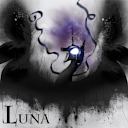





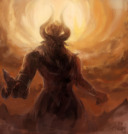


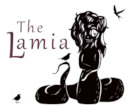

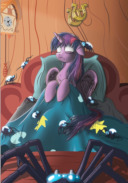

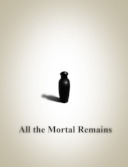


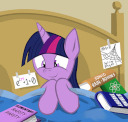

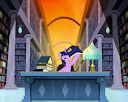

Quick question, is this the same village that Starlight Glimmer ran? I don't see an alternate universe tag, so I'll just assume it is if no one answers.
6053822 Our town had foals in it. There was a pack of them being shepherded around early on.
6054785 these ponies have locked themselves in emotional stasis. By trying to run from their feelings and problems they have gaureteed that they cannot escape from them.
This story made me feel things.
It's been a while since a story has done that to me.
Thank you.
6054885

6054785
I'd like to think that I get all of that. What I had been expressing was a desire to see a different type of villager. All of the characters so far are quite similar; they're all young(er) adults that are reasonably new to the village. They've only been there a few years. They're all of the age where they've had or are trying to start families. The two whose reasons we know are there for the same reason; death of a family. Their differences are subtle, but there is much the same between all of them.
My comment was that I was interested in the reasons for and the rationalizations. Ponies are a species who literally wears their purpose on their sleeve (well, okay, maybe a little further back). What does a pony have to tell themselves to not only give up their identity, but their purpose? That's what I'm curious about.
The newcomer is just fresh from whatever trauma caused them to seek out the village. They've spent their lives in a society built around a pony identifying their special purpose and then living it through the rest of their days. What would make them give all that up, so that they wouldn't even be willing to find comfort in the one thing they should be doing?
Conversely, what are the thoughts for the foal growing up in the village? This is a place that by design does not celebrate purpose or talent, or uniqueness, but tries to make everypony literally everything. Nothing is stable, nothing is permanent. Again, ponies by their very nature are driven to seek out a specific purpose in their lives and live up to it. So what happens here? This is a place where being a blank-flank could be seen as an asset, because you literally are blank; no special talents, nothing to stand in your way. A cute-ceañera must be a horrible thing for a young pony to go through. Additionally, how do they deal with the inability to preform their special talent except on days they get lucky in the draw? They're not old enough or hurt enough to want to lose themselves. So how do they fight against and what do they (and I imagine the rest of the village) tell them to rationalize away their desire to do what they are literally meant to? This would probably be the most interesting one to read, as it wouldn't be a choice the character had made that caused them to end up there, they were just born into it, and are suddenly having to fight the very nature of what they are because of it.
Thinking about it more, the veteran would probably be the least interesting to look into the mind of. They're a pony who has literally spent decades under this self-imposed lash, trying to grind away everything unique and special that they once were all to avoid the pain that brought them there in the first place. To find that they can't fight their nature, no matter how long and how hard they try, they'd just end up wallowing in the self-pity that keeps the whole place running.
That leaves the outsider. Again, my idea comes back to purpose. What are the thoughts of one who is still in a society who celebrates uniqueness and the purpose of self? What do they think of ponies who have stopped trying to be something in an effort to be everything and in turn are nothing? Is there appeal, is there pity, is there just confusion? Probably the doctor that Glenmore mentions would be the most accessible avenue. That, or a merchant, either one that deals with the village on regular basis or one who is new and stumbles upon it.
Ponies form a society in which talent and self are inextricably linked. Buckwheat is a farmer; always has been, always will be, can't change it no matter how hard he tries. He even admits he wants to do it. But to acknowledge himself as Buckwheat the Farmer is to also acknowledge he's Buckwheat the Farmer with a dead family. Remove the talent, remove the identity, remove the pain. That's the principle the village is built one.
So what I was curious about was how the village was viewed from various extreme perspective as opposed to those already immersed in it. Those who are new to its allure; those who've only ever seen the village; those who have seen it longer than not; and those who've only seen it in brief glimpses.
Dang, now that was an impressive story. I haven't read a lot of non-fanfiction fiction in the last few years, and every once in a while a story like this comes along that freshly convinces me that there isn't much difference.
Given that Igneous only is the BlackSmith about twice yearly, if we would know the length of the year, we could estimate the population of this village. My guess is about 180 or 210:
The year-length and seasons are totally arbitrary. We know that in Equestria, if not all over Equus, the seasons occur in a patchwork pattern, with ponies wrapping up the last season in their community and Cloudsdale delivering the new season.
Equus seems to have lifeforms similar to our lifeforms, so the year-length could not be too different.
If the year-length is arbitrary, the ponies should choose a convenient year-length, but the year-length must be close to our year-length because of the constraints of the lifeforms. That leaves 2 pvalues:
* 360
* 420
360 is very close to our year length, but is an highly composite number with 24 factors.
420 is slightly larger and has the same number factors as 360 (24), but is the least common multiple of all natural numbers upto 7, so that 7 of its factors are the numbers 1 to 7, which is useful for splitting things into small groups of days such that they fit evenly into the year and always fall of the same dates.
About half of 360 is about 180 and about half of about 420 is about 210.
The adult-population of this village is about 200, give or take.
I loved this in the writeoff (quite possibly my fave, once again solidifying you as an author who impresses me at every turn), and I am very pleased to see you have beefed it up so much from the original entry.
Ah! It's perfect!
6056593
Lot of good thoughts in here. I'm not sure I'll ever revisit the village, but if so, it would be as a foal.
6057096
I stand corrected, there were foals in Our Town. I don't know if I just missed that or if I deliberately blocked it out because of how horrible it is. Imagine how awkward it was when all the parents were so happy to get their cutie marks back when (probably at least some of) the kids had been raised from birth to believe cutie marks were evil. Do you think any of these foals ratted out their parents for thoughtcrime like in 1984? The presence of foals really makes Our Town so much darker.
I have written a review of this story. It can be found here.
6057469
Thank you. Like I said, really intriguing idea you've set up there with just so many aspects to explore.
If you do ever come back, I agree the foal would be the most interesting idea, and you could easily have it go either direction (affirming or dispiriting). Regardless, I know you'd pull off with aplomb.
This is a very painful story to read. It is horribly depressing because I can understand how
peopleponies could get hurt badly enough that they would want to do something like this. It's literally an entire village of ponies running away from their problems instead of dealing with them. The pain never goes away, and instead becomes the constant, dull throb that never leaves them. It's a village about being stuck in denial and never actually going through the whole grieving process. It's a dead end.This is masterfully written and now I want to throw something at you for making me feel sad
*throws upvotes and favs at you while sobbing*
Wow. Everyone else seems to be saying it already, but this story is both a pleasure and a pain to read. It seems like the ponies use the loss of their individuality as a method to hide from despair. Hits a little too close to home for me, so reading this was extremely uncomfortable. I suppose maybe that's a good thing, though. It's been a while since a story has really made me stop and think and to feel.
Thanks for another amazing story!
6058367
Recall that the story hints that all of these ponies still subconciously long for their lives before, are still drawn to their past and their calling. They actively reject it because they think they are happier now for having given it up. Whether or not they actually are is something entirely left open. Most of them are here because they don't want to feel the pain of loss again. But they do this by taking away anything worth getting attached to. This is similar to what you are talking about:
The fundamental issue here is that these ponies lack depth. This is strongly hinted at with the schoolteacher, who must actively resist being drawn to her own daughter for obvious reasons. Everything is meant to be shallow and transient, because these things are easily replaced and therefore no one has to worry about losing anything. But by doing this, they have already lost something in their lives: depth.
Are they happy despite this? Maybe. It is not my place to judge. But there are very clear pros and cons here.
To me, I am grounded by the things I am passionate about. I am given purpose by the people and things I feel strongly about. To live in a place like this would strip me of all meaning and purpose. Perhaps these ponies have already lost their purpose, and now don't want to try and get it back only to lose it again. They might find enjoyment in a shallow existence that has no emotional depth. Maybe this is what happens when you get older. Maybe you get sick of having emotional depth. Maybe you don't want to feel it anymore.
I don't know, I'm 20 years younger than you. I haven't been at this nearly as long. I've got some fight left in me. But then I am also a different person. I'm the kind of person who simply cannot exist without something to fight for.
Then again, we all have our own versions of paradise.
(Apologies for quality & brevity. Typing basically blind. Reasons.)
A lovely story. Marvelously written. Intriguing. Provoking.
As for its central question, I would say that some burdens cannot be laid down, some things cannot be given up. That which we are, we are. Same goes for ponies, I wager.
I definitely preferred the long version.
It's a dystopia, but your story is a masterpiece of writing. You should feel proud.
Once again, I find myself reading one of your stories and never wanting it to end. This story is beautiful. I could easily see a hundred more chapters written to expand on it. The two additional chapters past the expansion of the first from the Writeoff add so much depth. Even with the short chapters, we get an amazingly detailed view of the characters and their motivations and struggles.
i.imgur.com/X4NpPxt.jpg
6058367
Yes, it is running away. In fact, that's the entire point of the story; the characters are avoiding dealing with their issues by losing themselves, but they're not actually succeeding and are preventing themselves from moving on as a result. Spring Heath is intensely lonely and Buckwheat is scared of losing someone again. Glenmore is the only one of them who is living to any real extent, and she is also the one who takes the village's rules and standards the least seriously.
The story is criticizing the very idea that your personality is an arbitrary thing which can simply be ignored or erased. Indeed, the title is a reference to this. As I noted in my comment (6054785), their attempts at pretending like they can simply stop being who they are is ironically preventing them from changing who they are into somepony who is happier. By destroying their present they're leaving themselves with nothing but their pasts, and thus their past defines them to a greater extent than it otherwise would because they're not forming bonds or replacing what they lost with new things.
What's the point of not?
All of the ponies have desires, they just are pretending not to. Eschewing desire is entirely the opposite of what they've done. Someone who eliminates desire does not want things. All of these ponies want things - and it is clear in the case of Buckwheat and Spring Heath that they want exactly what they lost, and yet are afraid of actually trying to get that back because that would mean taking risks. But of course, you can't just not do things - every day, you make choices. They're just pretending not to.
The whole idea of the elimination of desire itself is pretty silly anyway - desire isn't bad. Generally speaking, the elimination of desire itself - as opposed to desire for some specific thing - is the domain of the hopelessly pretentious.
Not being totally worthless, really. I mean, let's face reality here: there's no reason to expect that not trying will be any less painful. You're still going to be doing something. If you choose not to try, then you will automatically fail no matter what. To not try is to be a failure every day, and to never succeed.
It is kind of like when you study economics and come to understand that money is time, and every time you pay for something, you are giving away a portion of your lifetime in exchange for what you're purchasing.
The short one is not as immersive and doesn't expose as many nuances as the long one, but the wording on this short is a bit better, especially at the end.
6058864 there's a saying about trying to get away from yourself. No matter where you go, there you are
6051792 Random, but beautiful.
6060300
This isn't Starlight Glimmer's town from the show, I don't think. The third chapter notes:
We also see mention of a cutie mark in the first chapter as well which is noted as "not her own", which they wouldn't know if they all had the same marks.
They aren't all forcibly equal here, but they're pretending to be.
The intro even says:
That underlying ineradicable inequity is a major point of the story, and you'll notice the one who is least concerned with being the same as everyone else (Glenmore) has a friend and seems unconcerned with showing off her special talent and is the happiest of the lot of them, and is trying to have a foal and live her life, while the other two seem to be, well, not. That's why the story seems to end on a happier note - Glenmore's story is much happier than the other two.
6060924
Why should anyone care about you if you're worthless?
Simple simulations point out that altruism is a bad strategy - it is reciprocal altruism, where altruism is the reward for those who behave altruistically, that is the optimal strategy.
When you look at the town, it is obvious that the entire idea is a lie - not everyone is equal. The story makes that very clear. Indeed, the story makes it clear that each pony's contributions are most important when they align with what they do well, and that otherwise, they are just going through the motions and doing worthless things. And indeed, everyone tacitly acknowledges this fact - the blacksmith, for instance, gets relatively little work, while when the actual competent blacksmith is in, they're busy all day.
So the idea that there is another kind of society is simple nonsense - there isn't one. It is the way that the world works. It is the principle of natural selection in operation.
When you say this:
You're missing the point.
It isn't an exercise in changing values. It is an exercise in denying reality.
People have tried forming such things for a long, long time, and they never work out in the long run - or even in the medium run. They tend to fall apart over time. My uncle joined a commune and it all fell apart by the time he was 60 - and that is a pretty long run for such a thing, and then the people were dumped back out into the world.
As they say, you have the right to your own opinions, but you don't have the right to your own facts. Or as Richard Feynman said, reality cannot be fooled.
Pretending that the world works in a different way than it does is the domain of fools and hypocrites.
Of course they're not in peaceful equilibrium; the story explicitly told us that they were in denial. Spring Heath in particular is terribly lonely, but Buckwheat is much the same way; he pretends that no one really matters to him by immersing himself in the town - he can never lose anyone again because he doesn't actually really have anyone anymore. They're all replacable! But he can't actually replace his wife and foal this way, and his noting of Glenmore touching her totem reinforces this - he knows that she isn't really his wife, however much he is pretending at the moment. Spring Heath can't let go, either; she said she had, but she can't, and she is still interested in her kid and is feeling worse and more lonely than ever.
Glenmore, on the other hand, doesn't treat every pony the same way and acts as though they are individuals, even within the town, and she continues to try and do things and progress in life. She is presented as being the happiest of the lot of them. She still has bonds, she has at least one friend, the way she behaves makes it clear that ponies aren't actually interchangable to her - and the way others react to her, they don't see her as interchangable either. But it is clear in the other pieces that the ponies aren't truly interchangable, and that the whole thing is a sham, and everyone just dances around that reality. Buckwheat is the only reason their farms aren't a total mess, and the blacksmith makes sure that they have the stuff they need when they're blacksmith.
Any technique which you believe will reduce your pain will indeed reduce your subjective feeling of pain. This is known as the placebo effect. This is how almost all traditional healing techniques work. If you believed that focusing on the color blue would make you hurt less, it actually would make you hurt less. I can give you sugar pills and if you think they'll reduce your pain, they will. Obecalp is an effective painkiller as long as you believe it is an effective painkiller.
And indeed, I'd wager that simply distracting someone would reduce their perception of pain.
There are things which do in fact mitigate pain, though, which actually do so on an objective basis. Stuff like morphine will dull pain chemically.
And then there are things which fix pain entirely, like healing. Just as there are pills which kill microbes and cure you of disease, versus things like cold medicine, which are all about symptomatic treatment.
Placebos can't actually make you better - they just make you feel better temporarily, and even then they may merely convince you that you feel better. If there is nothing wrong with you, then placebos can fix you - but if there is something wrong with you, then they can't. Obecalp may make your headache less bad, but it can't cure cancer.
What is wrong with these ponies is that they are avoiding dealing with their issues, and thereby are dealing with them indefinitely. Avoiding dealing with something doesn't make it go away - only children believe that. That's not how reality works. If you sit up in a tree, a bear will go away, but if your wife has died, avoiding dealing with it doesn't make your wife any less dead, and it means that you are actually constantly having to deal with it.
The correct way of dealing with a problem is to make it so it isn't a problem anymore, then you don't have to have it anymore. Pretending like you've fixed the problem when it is still lurking there below the surface is like painting over a moldy wall - the wall is still rotten, regardless of the new gloss of paint.
Yet many people behave in this manner because they are stupid.
They don't, though. The general store makes that pretty clear - a lot of people's special personal belongings are there. No one touches Glenmore's instrument; she's the only one who uses it. She buys it and returns it every month, over and over again, in a sham of lack of personal ownership. And indeed, Glenmore seems to note this as being usual and accepted.
Indeed, as the stories go on, you can see how with each story the town is more and more of a sham. You give up your totem when it is no longer binding you - but that's not actually what happens. Rather, ponies just give up their totems out of a sense of social obligation, and yet still yearn for them. Buckwheat makes it clear that everyone shows up at the blacksmith on the day that the competent blacksmith is there, and that that is when a lot of the important stuff gets done - everyone pretends everyone is equal, but the ponies tactitly acknowledge that this is not the case with their behavior. And Glenmore makes it clear in her passage just how much of a sham it all is, and that ponies recognize what is going on. And indeed, it is clear from the behavior of the people in charge each day that however much of a lottery it may be, they are perfectly capable of manipulating the system, and I strongly suspect (though the story never says one way or another) that the blacksmith ends up being a blacksmith coincidentally often when there is something that really needs to get done.
Then you understood nothing of what I said, and nothing of what the story was about.
The reason you deal with stuff like this is because it makes you a whole person, not because it benefits society. That it works out to make society better is a good thing, but isn't really why you do it (though it may be why others encourage others to be better). As David Wong once said:
This is nonsense. Desire is a good thing. Desire motivates us. Without desire, we'd all still be on the African savannahs. We certainly wouldn't be talking on the Internet.
Needs are much more problematic because they're compulsions. Desire is how we exercise free will.
You're wrong. They're trying to erase themselves to get rid of their pain. Hence the title, The Destruction of the Self.
This depends on the nature of the problem. Organic problems are irreversible because they're organic in nature; they're a result of problems with your basic functionality. They're hardware problems, and the only way we can deal with them is via medication.
Other kinds of problems - phobias, PTSD, trauma, ect. - both can be and have been successfully treated. We know how to treat this stuff.
The problem, ultimately, is that a lot of people don't actually want to get better. Do you know what the #1 way of quitting cigarettes is?
Quitting cold turkey. This is not because medications can't help, but rather because the people who have the willpower to quit - and stay quit - simply do so. A lot of people simply don't care enough to do so. Sure, they say that they want to do so, but people say stuff all the time. "We should feed the Africans." "We should stop ISIS." "We should really get this done."
When people actually care, they do stuff. All you need to move the world is a long enough lever and the willingness to use it. A lot of people never even look for the lever.
But you can deal with a lot of psychological ailments. Phobias have known treatments which are, in fact, effective. PTSD itself is basically a lack of response to trauma - basically, getting traumatized and then not getting over it like healthy people do. And people do recover from it - there is treatment that works.
A lot of people will simply avoid going to therapy, avoid keep dealing with it. The most obvious answer is that they don't really deep down inside want to get better - they've decided they want to be or deserve to be or need to be this way.
Reality doesn't change just because you refuse to acknowledge it. Never trying doesn't mean that you aren't worthless - it means you're both worthless and in denial.
It isn't about "replacing" a loss so much as it is just moving on and not dwelling on it. Spring Heath and Buckwheat are dwelling on their losses. Buckwheat is using everyone in the village as a replacement goldfish - a fake wife, a fake kid, that he doesn't have, that aren't really his. But he doesn't have the same depth of bond to them as he did to what he had, however much he might pretend otherwise. He's not a bad pony - in fact, he is noted as being a good pony - but he's scared of committing to anything anymore.
That's all excuses for being worthless.
And frankly, that's really what your post is.
An excuse.
You are trying to justify what you want to be true, rather than acknowledging reality as it is.
The story is about what drove the ponies to try and submerse themselves in such a society, where everyone is interchangable with everyone.
The story shows us that the ponies are not all interchangable, that pretending not to be yourself doesn't fix you, and that Buckwheat and Spring Heath are destroying themselves rather than "the self" - they're stuck in the past, unable to move on and build new things, and unwilling to fixate on such. And they're not happy, and they haven't moved on. There is a big difference between "not bad" and "good", and the story calls them out on this.
The story does this on purpose. We see the deliberate contrast of Buckwheat's thoughts, the promise that these things will fade, and then Spring Heath's section tells us that this is a lie - the ponies who gave up their trinkets did so because they should have faded, not because they did.
And they don't tell each other this because they're pretending not to be individuals anymore, pretending that it is working. And thus they all suffer, with or without their trinkets, because it should work. It is supposed to work. It must work! Look at all these other ponies for whom it is working! They don't have trinkets, clearly it must be okay. They said it gets better! Just give it time.
This is how every scam like this works. And it is why people like myself have to restrain ourselves from sneering. It is so obvious to us! How can people be so stupid?
The answer is that it is because people want to believe stuff to be true.
It is all so simple! Someone has all the answers. If it isn't working for you, clearly you just haven't kept at it long enough. It couldn't possibly be because it is all fake, right?
This is how many religions and cults and communes and other scams operate - people are loath to admit that they have been fooled, even to themselves.
You should probably avoid such groups, as you seem vulnerable to this sort of thinking.
Starlight Glimmer, "I am not 'power hungry.' I am the solution."
Hm, well. Interesting story.
6056593
"But to acknowledge himself as Buckwheat the Farmer is to also acknowledge he's Buckwheat the Farmer with a dead family."
There were a variety of thoughts I found interesting in that post, but I think that this is what most stuck out for me. I'd not thought to think of it that way, but, now that you've sparked that, I think that it makes a lot of sense.
If one is "Name the X" (Name the Spouse, Name the Parent, Name the Career Occupant, etc... and I'm wondering if they'd do Name the Pony Type and Name the Gender if they could), then being an X is a significant part of their identity and to a degree unique to them. The thing is, as that, it provides continuity from moment to moment... including extending back into the past, back to whatever they're trying to escape. They could adopt a new X... but, and I suspect that this ties into the way foals might be raised here, that would come with a risk of the new X ending up as a link to some trauma that hasn't happened yet. By just being "Name an X", well, that's in the moment. They're an X now, but any time being an X in the past or future is (ideally) disconnected from this period as an X. And there are many others just as much an X as they are, as there have been and will be. If something bad happens to the person Name1 an X1, well, tomorrow, that person won't exist; Name1 an X2 will. And why should Name1 an X2 worry about something that happened to someone else who doesn't even exist anymore?
Those are the thoughts your line sparked in me, at least.
(And, of course, as I think I saw brought up, given the limited viewpoints the story gives us, it's a bit difficult to see how well this philosophy is working out. I agree that it would likely be quite interesting to see how it played out in people who had been raised in it from an early age.)
6059359
I've been watching this discussion as I read through the comments and think that here seems like a good time to chime in.
"By destroying their present they're leaving themselves with nothing but their pasts, and thus their past defines them to a greater extent than it otherwise would because they're not forming bonds or replacing what they lost with new things."
I disagree that they're destroying their presents. I'm not sure how they even would do that. As I read it, they're attempting to, if anything, strengthen their presents to primacy. Of course, with the characters we see, if that is what they're trying, clearly it isn't fully working; they still think rather a lot about the past and future. Hm... though, the more I think of it, the less confident I am that I understood what you meant by "destroying their present".
"What's the point of not?"
Trading the loss in an absence of gain for the gain in an absence of loss.
"All of the ponies have desires, they just are pretending not to. Eschewing desire is entirely the opposite of what they've done."
I disagree that it's the opposite, but yes, they do seem to be experiencing difficulty living according to that philosophy.
"The whole idea of the elimination of desire itself is pretty silly anyway - desire isn't bad. Generally speaking, the elimination of desire itself - as opposed to desire for some specific thing - is the domain of the hopelessly pretentious."
I am curious about why you say that. Certainly, desire has its good points, but clearly to me it also has bad ones. Its elimination is quite possibly not the optimal path, but why "silly" and "hopelessly pretentious"?
"Not being totally worthless, really."
I am even more curious about why you say that.
To clarify, I am not saying you're wrong (or right) here, merely asking for information about your point of view. What conception of the worth of a person led you to make that statement?
"If you choose not to try, then you will automatically fail no matter what. To not try is to be a failure every day, and to never succeed."
Hm. You consider the lack of an attempt and the failure of an attempt to be the same thing?
"It is kind of like when you study economics and come to understand that money is time, and every time you pay for something, you are giving away a portion of your lifetime in exchange for what you're purchasing."
I am not seeing the connection with this, though, and so suspect that I am still misunderstanding you.
6060924
Before moving on to the points that stuck out to me, I'd like to mention that I found this in general a very interesting post.
(And sorry that I'm not commenting more; I'm rather tired at the moment.)
"You act like the point of the village is to eliminate the unhappiness that led them to join it. That's not the point of the village. The point of the village is to teach them how to _live_ with that unhappiness. To accept it and let it fade rather than to be consumed by the desire to erase it."
Hm. Why do you think that the point is just to teach them to live with it? And if that is in expectation that the unhappiness will eventually fade away, would it not still count as being for the elimination of the unhappiness?
"The anxiety and stress of experiencing it is carried forward through the process of replacing it. The integral of this anxiety and stress may outweigh the integral of the reward of replacement."
And there's the fact that replacing the lost thing is creating the risk of also losing the replacement.
"A desire by the definition I'm using is something it hurts not to fulfill."
Ah, thank you for that clarification; I had been having some difficulty grasping your distinction.""
"They have a society that is so far passing a test most intentional communities utterly fail at: the passing on of values to the new generation."
They also appear to have been running for at least twenty years so far, producing what they need and can and successfully trading for what they need but can't produce.
6061660
"Why should anyone care about you if you're worthless?"
Hm. Given that you gave this response to a question about a nonmaximal but also nonzero drive for self-improvement, do you believe that worth comes only with the maximal drive? I apologize if I am misunderstanding.
"Simple simulations point out that altruism is a bad strategy - it is reciprocal altruism, where altruism is the reward for those who behave altruistically, that is the optimal strategy."
I am not certain why you bring this up.
"Indeed, the story makes it clear that each pony's contributions are most important when they align with what they do well, and that otherwise, they are just going through the motions and doing worthless things."
Hm, interesting, so you do indeed appear to have a binary perception of worth here.
"So the idea that there is another kind of society is simple nonsense - there isn't one. It is the way that the world works. It is the principle of natural selection in operation."
Well, in reply to this, firstly, you appear to be ignoring that even nonviable, unstable societies are still societies for the period of their existence. A badly-made car is still a car.
Secondly, though, as far as I know, it is often optimal in nature to not exert the most effort one is capable of. Sometimes a species evolves to be faster, stronger, tougher, smarter, more rapidly reproducing, etc. to survive new predators or keep up with new prey, yes, but other times a species evolves to be smaller and reproduce less frequently to conserve resources.
Now, the concern I suspect you have (and that I am not bereft of) is the far future survivability and adaptability. Clearly, this society is surviving now, and it has done so, with contact with the outside, for at least two decades. I think that it is reasonable to say, if not necessarily certain to be true, that if its environment remains stable, it will remain viable. At the same time, though, we can readily see at least one potential problem: they rely for medical care on an external element.
However, it is also a possibility that they do not place an especially high value on their society's indefinite survival; that would, I think, fit with what seems to be the way they do things. They also do not appear to me to be a significant threat to those outside their group.
Given that, if they are happy with how things are going for them, I do not particularly see the point in trying to convince them that their way is wrong without a much superior alternative ready.
Tying back into the line you started your post here with, if there's no reason for anyone to care about someone because that someone is worthless, why should anyone care about someone being worthless?
"It isn't an exercise in changing values. It is an exercise in denying reality."
"As they say, you have the right to your own opinions, but you don't have the right to your own facts. Or as Richard Feynman said, reality cannot be fooled."
"Pretending that the world works in a different way than it does is the domain of fools and hypocrites."
Hm... Again, though, are they in fact doing that? Are they saying that this way of life will definitely long endure, or are they saying that they don't particularly care? Looking at this paragraph
"“Yeah, maybe,” I reply. It is our answer to everything in this village – maybe. Maybe I’ll meet you for dinner. Maybe I love you. Maybe I’ll see you again. It’s a safe word, one that cannot bind ponies together. It is the ultimate expression of the purgatory in which we exist."
I'd be more inclined to think the latter. Maybe their society will still be going in ten thousand years. Maybe it won't even make it another ten years.
Whether or not that way is best, I think that it is at least a way. It certainly doesn't seem to be a good way for you, but then, you don't have to follow it.
"The correct way of dealing with a problem is to make it so it isn't a problem anymore, then you don't have to have it anymore."
Using the example you were talking about in the paragraph above this (which I'm not quoting for reasons of space), how do you make your wife being dead not a problem anymore, if you can't solve it by restoring her to life?
"This is nonsense. Desire is a good thing. Desire motivates us. Without desire, we'd all still be on the African savannahs."
I'll point out that without desire, we'd also lack a desire to not be on the African savannahs.
Hm. Titanium Dragon, what, if I may ask, is your primary driving value (or values)? What do you see as the purpose of your life, and why? You seem to feel very strongly about it.
This is a really interesting idea, but I think the horror elements which are drawing me to it are begging the "Dark" tag. (Anyone else notice that that episode was basically a horror episode?)
I love this story and the discussion that it generated in the comment section. One thing that struck me and I haven't heard anything about it in the discussions so far, is Glenmore's happiness in this village.
I don't think that Glenmore had the least to lose. I think that she as all the others had roughly the same. She just doesn't dwell on them any more. She does have bouts of sadness (as evidenced by her touching her locket) but, it doesn't define her any more. So what changed and why is she still there? Why is it that she is able to be happy in this village? It doesn't say but, I'm inclined to believe that the ponies can come and go as they please. The only thing that is keeping them there is themselves. She has friends, possessions (as much as one can have in this village) and as one of the commentators said, doesn't take the rules too seriously. So again why is she still there?
I think that there is a compiling reason why she stays and something unique to this village. That something has a name. "Buckwheat" It was hinted at that she has feelings for Buckwheat. He likes potato casserole. So when they're together what does she make? He's favorite dish. She wants to have sex with him and then changes the ledger so that he gets to be a farmer once again. That doesn't sound like someone who doesn't care.
Hi there. Guess what, this day is now guaranteed to be super-duper amazing, because your story just got reviewed by The Best Authors.
i.imgur.com/aB4hQq5.jpg
You may find the review here: (link)
Someone needs a dose of Anthem, a round of hard core counseling, and a thump to the noggin. Noone can find happiness by running away from sorrow. Noone can escape suffering by destroying themselves. Men with poisoned tongues have tried to sell this lie for millennia... because nothing is easier to control or exploit than someone who is continually laboring to strangle their Self in its crib.
6062158
Because desire is what makes us do things.
The former is worse because you have no chance to succeed. In the end, what matters is whether you have succeeded or failed.
However, when you're going forward, the future is a mystery to you - you don't know if you will succeed or fail if you try doing something. If, however, you do not try to do something, you know the outcome for certain - you will fail.
Ergo, to not try to do something is to automatically be a failure at it.
The same way everyone deals with death: move on. Humans have been doing it for thousands of years.
There is no purpose to life beyond that which we arbitrarily assign to it.
I personally am an anti-absurdist.
6062548
6062548
how well is the new generation being taught? How well are they being cared for? What about emotional attachments? No one cares about them enough to fight for them? That could be pretty devastating.
6063592
Explaining something does not make it true.
Needs and desires are really pretty much indistinguishable in reality in many cases in civilized society. People forgo eating food (a need) in favor of, say, playing a video game or doing something else they find entertaining (a desire), and people often feel psychologically compelled to continue to participate in such activities to the point that it feels like they "need" to do it to them. Psychologically speaking, it makes sense; desire is likely fuelled by much of the same biological machinery that need is fuelled by, and indeed, humans can neglect both needs and desires - and in much the same way. Indeed, the idea of fasting - a common religious and medical practice - is deliberate neglect of a need. The line is frequently blurred for people, and in reality, most people do vastly more than they need, and yet will treat it as if it were a need.
Yeah this story is dark.
6062885
"The former is worse because you have no chance to succeed. In the end, what matters is whether you have succeeded or failed."
"Ergo, to not try to do something is to automatically be a failure at it."
It is true that people designing domestic washing machines do not try to make them double as turbofan engines, and indeed, the washing machines that result, if strapped to the underside of an airliner's wing, would make very poor turbofan engines. Did the designers fail at making a turbofan, though? If they did, then the engineers who sent humans to the moon are abysmal failures; there are so very many things the Saturn V doesn't do.
Oh, unless you are using "failure" without the usual negative connotations? Though, no, you do pretty clearly there say that failure is bad.
"I personally am an anti-absurdist."
Hm, I am not familiar with that philosophy.
I don't seem to be having much luck researching it, either; the best-looking source I found appears to be against it. Would you mind explaining to me your view of it, please?
6065346
This is a strawman argument and has nothing to do with anything anyone said. A washing machine and a turbofan engine have two entirely different purposes. Making one choice instead of another is an opportunity cost. Making the choice to do nothing of value, however, is to spend the opportunity cost with no potential or actual gain at all.
Anti-absurdism is more of a goal than a philosophy, I suppose; it is to prove one of the core tenants of absurdism wrong.
6065389
"This is a strawman argument and has nothing to do with anything anyone said. A washing machine and a turbofan engine have two entirely different purposes. Making one choice instead of another is an opportunity cost. Making the choice to do nothing of value, however, is to spend the opportunity cost with no potential or actual gain at all."
It was intended to illustrate the idea that the worth of a thing depends on what that thing is being evaluated as. The same activity may be of low value when looked at with one goal in mind and of high value when looked at with another goal in mind. To pick another example, many people disapprove of "blue sky research" and think that it's a waste of money; others think that it is immensely valuable and back that up by paying for enormous instruments and programs.
"Anti-absurdism is more of a goal than a philosophy, I suppose; it is to prove one of the core tenants of absurdism wrong."
What tenant is that?
6066527
Fixed, thanks :)
And yes, I've thought about it. No plans to for the moment, though – I like my hobby where it is.
As the specific non-general use of the title, 'dad' here should be capitalised.
Semicolon abuse! Sound the klaxons! (should be a colon)
Beyond those very minor points, I think I got too hung up on the child abuse to see what the story was supposed to be about, or what the 'point' of it was, if there was such a thing.
6069600
You must've loved the season premier, then.
You can't have a nightmare/ if you never dream.
I think this story is in some ways the ultimate expression of that sentiment. In one way, completely accurate. And yet also profoundly sad. A beautiful story.
6069831 Yeeeeeeah. I should totally get around to watching that at some point. (S4 kinda put me off, perhaps permanently)
That said, I imagine there is a difference between voluntary submission and coercion. From what I know of the episode, and based on the fact that it's MLP at all, the way the village was run was considered a Bad Thing™ by the end. That makes a significant difference.
6071899
I think his concern was that the spectre of child abuse raised by the story, no matter how notional or unfounded, prevented him from understanding the story enough to critique it.
Maybe it's time to start adding trigger warnings to my stories! I've seen people do that on Tumblr.
Both versions of this story were absolutely brilliant. Sad and poignant. Wonderful as always.
6071899 In short, no.
I feel like all the details in the long version, ESPECIALLY the sweeter ending, give it a MUCH bigger appeal. IMHO I feel like it's those details that really brings both the characters and the village to life. It also better explains or at least paints a better picture of the reasons or the suffering these ponies have endured, in order to live in the sort of purgatory that they have.
I would LOVE to see more of this story, and see more details about the other ponies in this village.
In short, this story freaks me out. But that's a good thing.
It's vaguely unsettling (as it should be) and beautifully written. With the extended story, though, I was hoping to understand a bit more about the village. I believe the first time reading it packed the biggest punch, and repetition detracted from it. Not much, mind you, but I think the extra chapters can be used to develop the village more.
Wow. This was harrowing. I really like the extended chapters as well. Another brilliant story from you!
Why the fuck was this in my Read Later folder?
Why did I wait at least a month before getting around to reading it?
How many other treasures have I forgotten about in that folder?!
*likes, faves, adds to best stories list, then rushes off to clear the rest of my read later list*